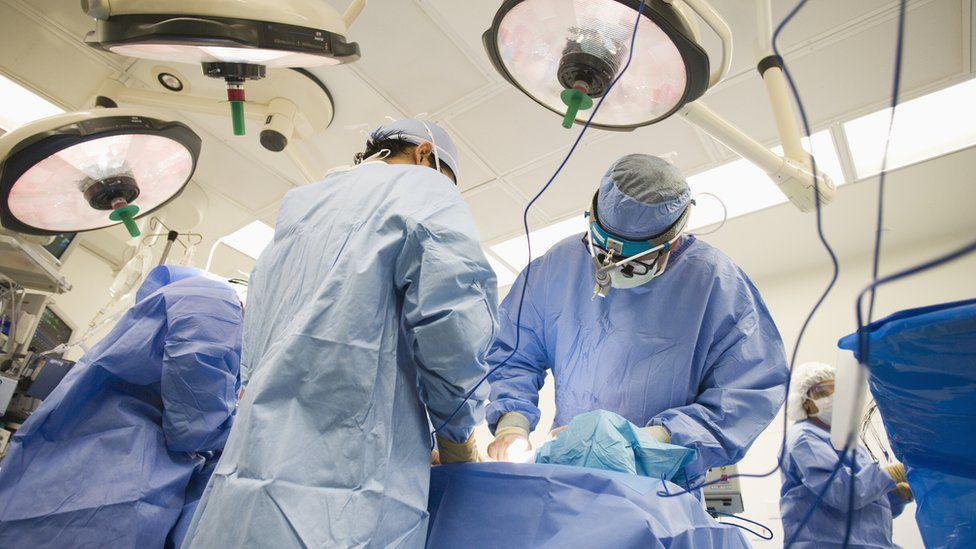Stormont crisis will leave health staff 'demoralised and disrespected'
- Published
- comments

John Compton, a former chief executive of the Health and Social Care Board, said the health minister was powerless
A former health chief has warned that workers will feel "demoralised, leaderless and disrespected" without a functioning government.
John Compton, former chief executive of the Health and Social Care Board, said it was "disappointing and shocking" that the system was in crisis again.
He said staff needed encouragement as we emerged from the pandemic.
Mr Compton also said the present health minister remained powerless to take major decisions.
Speaking to BBC News NI, Mr Compton said: "It requires political leadership, political accountability, clarity over the management of money and the strategic reshaping of services."
The Department of Health said it was committed to delivering change and added that "standing still and accepting the status quo is not an option".
There is currently no power-sharing government in Northern Ireland after the Democratic Unionist Party (DUP) said it would not go into the executive until there are significant changes to the Northern Ireland Protocol.
Caretaker ministers, who were in post before the collapse of Stormont in February, can keep running their respective departments but no new decisions, such as agreeing a budget, can be taken.
If subsequently the Northern Ireland Assembly is put into long-term cold storage, the system would be led by the permanent health secretary, Peter May, who would also become the chief executive of the health and social care system.
'Issues need sustained investment'
According to Mr Compton, while anyone can take care of the system, what was needed was "someone in charge and who has power to facilitate change".
Mr Compton left the health board in 2014 and was responsible for producing one of several health reports around reform called Transforming Your Care.
Without a functioning executive, Northern Ireland will not obtain a multi-year budget which prevents reformation of services, changes to how hospitals deliver those services and any decisions around the workforce.
This impacts actions to tackle hospital waiting lists - and there are questions being raised around accountability.
The Department of Health told BBC News NI that the issues facing health and social care "are well known and require sustained investment and reform".
"Political and budgetary certainty are highly important when it comes to rebuilding services," the department said.

The protection of health and social care featured on all political manifestos in the most recent election
In March this year, the Health and Social Care Board closed.
The board held the health purse strings, trusts would have gone to it to ask for money - money to pay wages, operations and medical equipment.
It was held to account during monthly meetings by its board, other public bodies and via published minutes which could be read by journalists.
Now the Department of Health takes the lead on the day-to-day running of the health service and the minister is ultimately responsible for everything.
'Accountability through the public and media'
Ann Watt, director of the independent think tank Pivotal, said accountability was a big issue.
"There had been an expectation that if there was no executive there would be an assembly and the minister (for health) would therefore be held to account in the chamber and in committees," she said.
"Unfortunately that is not in place so accountability will have to be directly through the public, the media, through professional bodies and clinicians."
The Department of Health said that "the former functions of HSCB (Health and Social Care Board) are now departmental responsibility and subject to departmental governance and accountability arrangements".
"Following the closure of the board, the department is accountable to the minister for all of the functions delivered by the former board staff under the direction of the department."
It added that the delivery of functions is "subject to the appropriate level of scrutiny".

Last week Northern Ireland's Health leaders called on assembly members to "get back to work"
In the recent assembly election, the protection of health and social care featured on all political manifestos.
When the public went to the polls, it was the expectation of most voters that a government would follow - but that has not happened.
Pivotal's Ann Watt said not having a brand new government in place was "unfair on voters and unfair on the people who are going to suffer most ie those on waiting lists, children who won't get free school meals and the most vulnerable".
'Process needs radically changed'
Last week, Northern Ireland's health leaders called on the recently elected assembly members to "get back to work".
While meeting the political parties on Monday, the prime minister repeated the call.
The Royal College of Surgeon's Mark Taylor said we are already seeing the "impact of a process that needs radically changed".
"Is it acceptable to sit eight hours in the back of an ambulance? Is it acceptable to wait five years on your hip replacement? Is it acceptable to wait on a trolley for 24 - 48 hours? Is it acceptable to have a two-tier system of health in Northern Ireland - is it acceptable to keep kicking the can down the road?
"The answer is no."
In a statement, the Department of Health added: "The Departmental Management Board includes two non-executive members appointed through the public appointments system and scrutiny includes the delivery of the functions transferred to the department.
"The department's Audit and Risk Assurance Committee was established to advise the accounting officer, through the departmental board, on the quality of assurances they receive about strategic processes for risk management, governance, internal control and the integrity of financial statements."
It said the committee comprises of two non-executives from the board and two independent external members.
The committee's oversight "extends to those former functions of the board which are now under the direction of the senior civil servant".
Related topics
- Published13 May 2022

- Published12 May 2022

- Published6 February 2022
